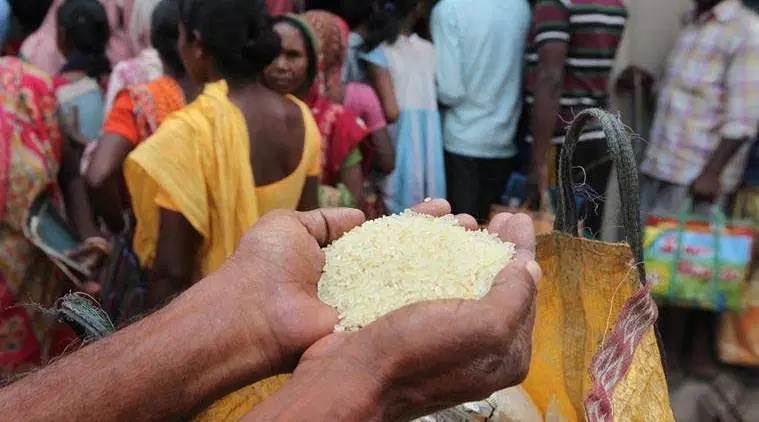Stay updated with the latest - Click here to follow us on Instagram
Tamil Nadu question on One Nation, One Ration: Who will bear extra cost?
Strongly opposing the scheme by calling it “anti-Constitutional,” DMK president M K Stalin said the attempt to roll it out immediately is “unilateral autocracy”. Indicating that this is an attack on India’s federal structure, Stalin pointed out that PDS is a state subject.
 The Centre’s ambitious plan to bring the entire system under a single network is expected to help a large number of migrant workers, who travel constantly and work in faraway places.
The Centre’s ambitious plan to bring the entire system under a single network is expected to help a large number of migrant workers, who travel constantly and work in faraway places.
The Centre’s proposed “One Nation, One Ration Card” scheme has kicked up a controversy in Tamil Nadu, with political parties and subject experts raising concern at the possible threat that a single national ration scheme will derail the state’s universal Public Distribution System (PDS), arguably one of the best PDS models in the world.
While political leaders in the state have their own fears — like they had with the National Food Security Act (NFSA) five years ago — experts have also raised concern in the national scheme’s implementation, as the Centre has announced that it will be rolled out within a year even as there is lack of information about the exact plan and lack of consultation with the stakeholders.
Strongly opposing the scheme by calling it “anti-Constitutional,” DMK president M K Stalin said the attempt to roll it out immediately is “unilateral autocracy”. Indicating that this is an attack on India’s federal structure, Stalin pointed out that PDS is a state subject.
READ | DMK opposes Centre’s ‘one nation, one ration card’ scheme
Tamil Nadu’s Food and Civil Supplies Minister R Kamaraj was careful in his reply to the Assembly, promising that the state will implement it only after scrutinising all aspects.
The Centre’s ambitious plan to bring the entire system under a single network is expected to help a large number of migrant workers, who travel constantly and work in faraway places.
Whoever has a ration card in Tamil Nadu is eligible for 20kg free rice every month, unlike a price — Rs 3 — being charged per kg rice in states that have implemented National Food Security Act. While the state is not self-sufficient in grain, it has developed a mechanism to draw more from the Central pool to run an efficient PDS system. Whenever the Central pool is flooded with stock over the usual quota allotted for states, they sell it in open market at a slightly higher price for states that need extra supply.
A senior official at the state Civil Supplies and Consumer Protection Department said, “Our limited knowledge is that a ration card provided to citizens under ‘One Nation, One Ration Card’ scheme can be used by the beneficiary in any ration shop in the country.” The official said it remains unclear who will bear the cost for ration supplied to people from other states when PDS is a state subject.
“We already face a huge financial burden to run an effective universal (PDS) scheme. If the demand increases further (to cater to workers from other states), will the Centre bear that additional cost? Or will the state eventually be forced to scrap universal system,” the official asked.
Tamil Nadu’s PDS scheme serves 1.99 crore ration card-holders.
READ | Govt to launch ‘One Nation One Ration Card’, access to ration shop anywhere in the country
A state government official said the Centre has given the states and Union Territories time until June 30, 2020 to implement the national scheme.
Referring to Union Food and Public Distribution minister Ram Vilas Paswan’s statement that no poor person will be deprived of PDS entitlement even if he/she relocates to another place, Reetika Khera, associate professor at IIM-Ahmedabad and an economist with expertise in public distribution system, said the rationale for this system with portability of ration cards is that it will be convenient for migrant workers. “Most migrants do not go with their family to another place and leave their ration card with their families,” she said. “Portability is not so useful for them in such a scenario. For migrants, it would be much better to expand community kitchens such as Amma Canteens (a successful initiative under late Tamil Nadu CM J Jayalalithaa) and Indira Canteens (a similar food subsidisation programme run by Karnataka government).”
Khera also pointed out that the Chhattisgarh government’s experiment with portability a few years ago was not expanded beyond some areas. “When portability did not get scaled up within the state, should we try inter-state portability,” she asked.
For portability, Khera said, the government needs to rejig its supply chain management for PDS outlets. “If ration is allocated only for local residents, and migrants or people from neighbouring areas show up, there is a risk that ration supplies run out before local residents can buy,” she said.
J Jayaranjan, director of the Institute for Development Alternatives, who specialises in Tamil Nadu’s food sector, noted that PDS coverage of states that follow the National Food Security Act is only 70 per cent of rural population and 50 per cent urban population. “Tamil Nadu’s universal PDS scheme covers 95 per cent rural population and 70 per cent urban population. Tamil Nadu has a large number of migrant workers from north and north-eastern states,” he said.
Jayaranjan asked: “When you cannot have two kinds of PDS in a state, what will happen to the free rice scheme under Tamil Nadu’s universal PDS model once portability is implemented? Who will bear the cost of supply for additional (ration) cards? Or will the state’s free rice schemes be changed? There are many such confusions.”







